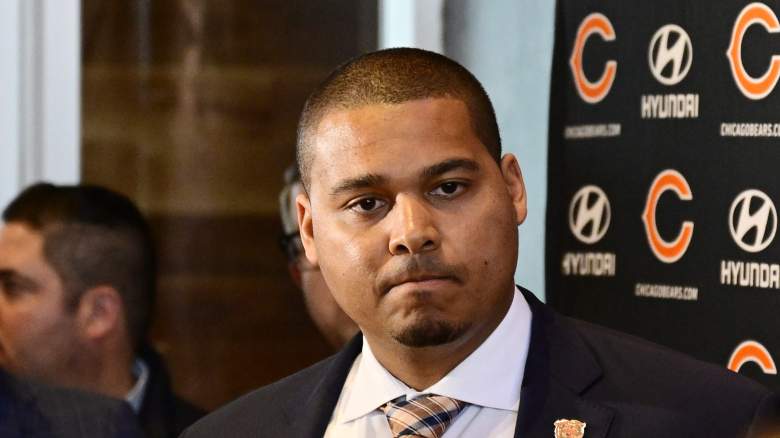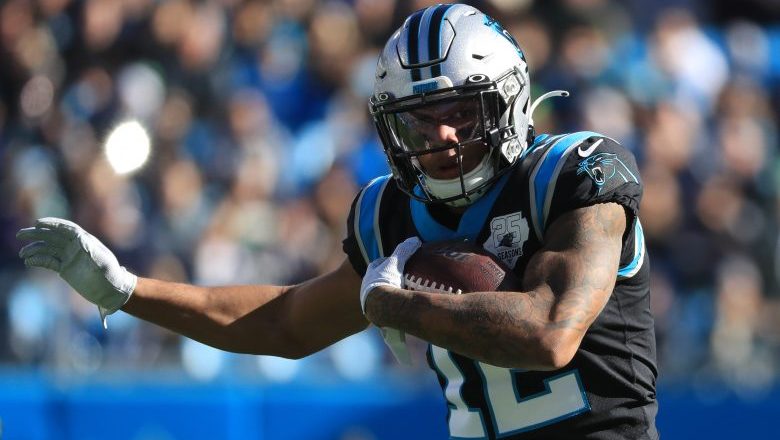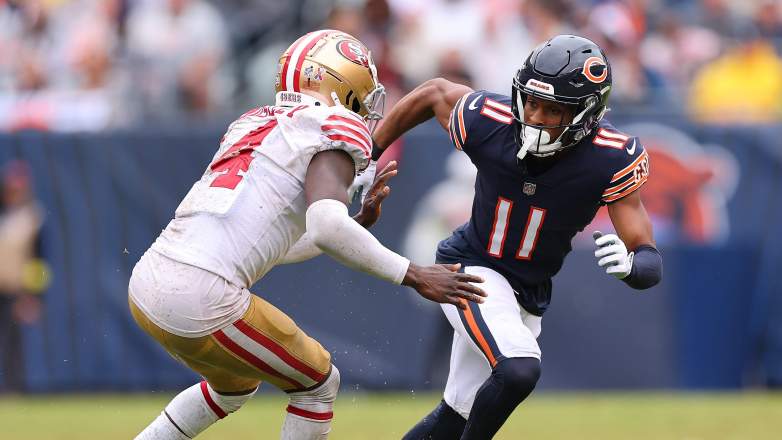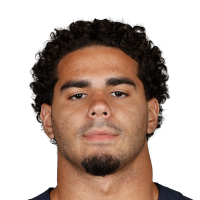
The Chicago Bears reeled in a massive haul from the Carolina Panthers by trading away the top overall pick, but the deal is likely to leave one prominent player out in the cold.
Chicago flipped the No. 1 selection in the upcoming NFL Draft for the No. 9 and No. 61 picks this season, a 2024 first-round selection and a 2025 second-rounder. On top of that, the Bears added wide receiver D.J. Moore, who immediately becomes the most accomplished pass-catcher on the roster.
Now, instead of the lack of playmakers the Bears dealt with much of last season, the problem is an excess such players, at least in financial terms. Due to Moore’s salary and three extension-eligible passing targets — tight end Cole Kmet and wide receivers Darnell Mooney and Chase Claypool — the Bears will probably need to cut bait with one of the aforementioned performers, lest the team invest north of $60 million in the four of them annually over the next several years. Chicago can probably afford to do so, but there are several other areas of need on the roster that make such a hefty commitment counterintuitive.
ESPN’s Bill Barnwell on Friday, March 10, authored a deep dive into the winners and losers from the Bears/Panthers trade, naming either Mooney or Claypool the first significant loser of the bunch, with an eye toward Mooney as the likely odd man out moving forward.
Bears’ Acquisition of Moore Means Mooney’s Days Likely Numbered in Chicago

GettyFormer Carolina Panthers wide receiver D.J. Moore is the newest member of the Chicago Bears offense.
Barnwell’s conclusion is based purely in financial reasoning, as Mooney is projected to command more money per season than will his counterpart Claypool.
Moore is under contract for three more years at an average of $17.4 million, which is a relative bargain for a mid-tier No. 1 receiver. The Bears likely will look to extend the 25-year-old’s deal after next season.
Claypool, Kmet and Mooney are all entering the final year of their respective deals, which means they’re eligible for extensions this offseason. On a team without Moore, the Bears could have plausibly signed all three of them to new deals. Getting Moore was the right move, but Mooney’s market value is probably about $18 million per season, while Claypool is closer to $12 million after two straight disappointing campaigns. Kmet would be in the ballpark of $14 million.
The Moore acquisition likely means either Claypool or Mooney will leave the organization, either via a trade this offseason or in free agency next year. Mooney has been the more productive player, but Poles signaled his interest in Claypool by trading what ended up as the first pick of the second round to acquire him.
Bears’ Trade For Claypool No Longer Makes Any Sense in Chicago

GettyWide receiver Darnell Mooney (right) of the Chicago Bears is defended by cornerback Emmanuel Moseley (left) of the San Francisco 49ers during a game at Soldier Field on September 11, 2022 in Chicago, Illinois. (Photo by Michael Reaves/Getty Images)
The logical move, as Barnwell notes, now becomes an attempt to trade Mooney for relatively equal value to what the Bears gave up in order to acquire Claypool.
Mooney has been a good player in Chicago when healthy, pulling down 81 catches for 1,055 yards and four touchdowns in 2021, per Pro Football Reference. Despite injury issues, he was still the team’s leading wide receiver in 2022, finishing behind only tight end Kmet in the major pass-catching categories. Mooney is just 25 years old and will be playing in only his fourth NFL season this upcoming year.
However, whether the wideout is worth a high-end second-round pick is up for debate, especially as teams will understand the Bears are looking to move him not out of desperation, per se, but out of redundancy and due to financial concerns.
Ultimately, the Bears will take the best offer, be that a third-round pick or whatever else they can scrounge from a receiver-needy competitor. The entire situation, though, brings further into question the logic of Chicago’s decision to deal for Claypool during the middle of a losing 2022 campaign, as well as the choice to give up a second-round pick to acquire him.
Barnwell named the Claypool trade itself a loser within the context of the larger deal made Friday with the Panthers, namely because it makes even less sense now than it did a handful of months ago. If Mooney is, in fact, the better player, then it doesn’t even matter if the Bears get a high-end second-rounder for him in a trade. That means what the team accomplished was essentially flipping Mooney and the top pick in the second round for a worse receiver in Claypool and a worse draft selection — and that is the best-case scenario.
The mistake isn’t the end of the world, and Bears general manager Ryan Poles looks to have made up for it — and then some — with the haul he got from Carolina for the No. 1 overall selection. Still, the Claypool trade was clearly a misstep that will leave the Bears a little worse off in 2023 than they would have otherwise been, regardless of the ultimate resolution.














































































Comments
Bears Star Destined For Trade Block Following Panthers Deal